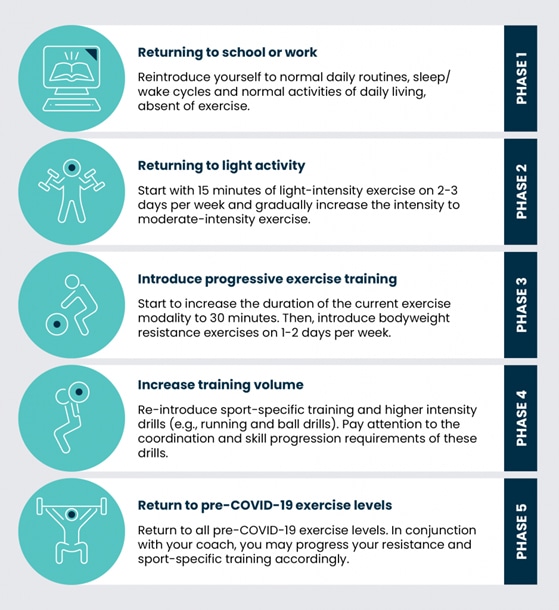How to exercise during and post contracting COVID-19
With covid-19 cases on the rise in Australia, there is a lot of discussion around the impact that exercise has on COVID-19 recovery and the risk of ‘long covid.’. COVID-19 can present with a range of different symptoms such as a sore throat, running nose, loss of taste and smell, muscle aches and pains, and shortness of breath just to name a few. It can affect people in different ways from very minor to quite severe so the recovery process will be different for everyone.
Exercising when not testing positive to COVID-19
In some studies, regular exercise has been shown to improve the body’s immune response to some transmittable diseases such as bacterial and viral infections. Exercise has also been shown to improve our mental health which is crucial during COVID-19 times. It is important to maintain a reasonable level of cardiovascular, muscle strength and lean muscle tissue as it assists in preventing and managing a large number of health issues.
Type 2 Diabetes Mellitus and Exercise
Exercise has many benefits for improving the health status of individuals living with T2DM. Regular exercise can reduce weight, lower blood pressure, and reduce excess adipose tissue around the stomach and waist which reduces the risk of comorbidities associated with T2DM. Regular exercise also alters how our muscles react to the glucose in the bloodstream, becoming more receptive to the glucose for hours after exercise. Both aerobic and resistance training has been shown to improve insulin action, blood glucose control, and fat oxidation and storage in muscle.
Those who are diagnosed with T2DM have an increased risk of other health issues compared to those who do not have T2DM. these health issues include heart disease, hypertension, hyperlipidaemia, and kidney disease. Regular exercise helps to reduce the risk of these comorbidities in people with T2DM.




Exercising when testing positive for COVID-19
If you have tested positive to COVID-19 and are displaying moderate symptoms of COVID-19, the Department of Health recommends that you refrain from exercise for period of time until symptoms improve. However, if you have no symptoms or mild symptoms, moderate exercise is permitted and encourage but it is important to monitor for symptoms and adjust your intensity.
Moderate exercise while having COVID-19 can be achieved by:
- Walking around your home or yard
- Implementing a low intensity yoga or stretching program
- Simple strength exercises using body weight such as incline push ups against a wall or bench, calf raises, and sit to stands from a chair or alternatively utilising weights if you have them in the area you are isolating in.
- Reducing your amount of sedentary time – have regular breaks from sitting or lying
If you do choose to complete low to moderate exercise with COVID-19, you must stick to isolation protocols and cease or alter your exercise if symptoms worsen. If you develop severe symptoms, seek medical attention urgently.
Exercise & Recovery after COVID-19
It is common to experience mild symptoms up to 6 weeks after recovering from COVID-19. Everyone’s recovery from COVID-19 may be different so there are no set guidelines with returning to exercise, but the return to exercise should be done gradually and follow set phases. This starts with returning to normal activities of daily living such as work and study. If you can tolerate this without the presence or exacerbation of symptoms, it is then considered safe to begin light physical activity. Exercise can then be progressed slowly and eventually you can look to return to all previous activity levels without any lingering symptoms.
It is important to be cautious of certain symptoms when returning to exercise. The following symptoms are red flags and you should cease exercise and seek help from your GP and an Accredited Exercise Physiologist before recommencing:
- Chest pain and chest palpitations
- Unusual / increased shortness of breath on exertion that isn’t proportional with your expected recovery
- Symptoms of thrombosis such as swelling, heat and pain in the legs particularly the calf region
When returning to physical activity, be sure to go at a steady pace and listen to your body. Stay within the range that you feel comfortable and can manage without any exacerbation of symptoms outside of what would be expected from exercise. If you are unsure on what activity you can do during or after COVID-19, or just need some further guidance book in to see one of our Accredited Exercise Physiologists for a personalised exercise program.
Useful Links
https://exerciseright.com.au/the-dos-and-donts-of-exercising-after-covid-19/
https://exerciseright.com.au/covid19-exercise/
https://www.health.gov.au/health-alerts/covid-19/testing-positive
https://www.tandfonline.com/doi/full/10.1080/14787210.2020.1794818
https://exerciseright.com.au/athletes-guide-to-returning-to-sport-post-covid-19/
